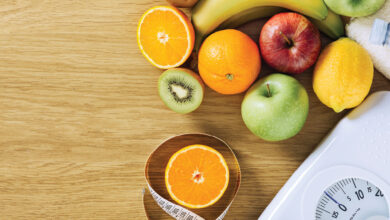
You’ve probably heard the saying “you are what you eat”. I would like to amend that to “you are what you absorb”. If your digestive system isn’t functioning optimally and you’re not properly digesting and absorbing your nutrients, you could have the best diet in the world and it wouldn’t matter – you would still be deficient. So, how do you know if your digestive system isn’t working well?
My questions to you would be:
- How do you feel after eating?
- Do you often feel bloated or uncomfortable?
- How is your appetite?
- Are you hungry all the time and can’t go without snacks between meals, or do you have a poor appetite and feel full very quickly after eating only a little?
- Do you get heartburn, feel nauseous, or burp a lot?
- Are you regular – meaning do you have daily bowel movements that are well formed but easy to pass, or instead do you tend to have constipation or loose stools?
If any of these apply to you then, yes, it’s a sign that your digestive system is not functioning optimally. So, how do we fix that? I’m going to walk you through some of my top tips and insight for optimal digestion and then tell you what you can do if you’ve tried everything and nothing has worked.
Where does digestion start? You would assume in the mouth, right? It actually starts in the brain as we anticipate eating. We’ve all felt our mouth water as we see or smell a particularly delicious meal. This is an important part of our digestive process – to be actively involved in what we are eating. This means mindful eating, making time to slow down, sit down, and do nothing else but savor our food and engage our senses. And if this is done with loved ones and a sense of gratitude, even better. We digest our food better when we are present and actively enjoying our meal (not scrolling, watching a show, doing work, or driving). Make time to adequately chew your food instead of wolfing it down.
Next, let’s focus on our mouth and saliva glands. Good saliva production is extremely important for healthy digestion and influences every other step of digestion that comes afterwards.
Saliva plays a role in:
- Lubrication and binding – We need saliva to form the slippery food bolus that is easily swallowed and slides through the esophagus without inflicting damage.
- Solubilization – Dry food needs to be solubilized in order to be tasted.
- Oral hygiene – Saliva flushes food and debris from the mouth and keeps bacteria from building up. It also contains lysozyme, an enzyme that prevents bacterial overgrowth.
- Starch digestion – Saliva contains amylase which initiates dietary starch digestion.
It is absolutely essential to not drink liquids with meals as this stops the production of saliva (the worst culprit is iced drinks, as the cold really brings your digestion to a grinding halt). This seems like a small thing, but it actually hijacks the entire digestive process to a degree you wouldn’t imagine.
I personally do not drink any liquids 30 minutes before meals and for at least one hour and 30 minutes after, and I have noticed such an improvement in my digestive power since I began this practice. You might feel a bit thirsty at first but your body will adjust quickly.
Top tip: if you have supplements that need to be taken with food, just chew your food as you normally would and then pop the supplement in right before you swallow. Saliva actually lubricates much better than water does, so with a little practice, this works brilliantly. If that is too hard for you initially, try a little bit of yogurt or kefir, as they will not dilute saliva as much as liquids.
Onto stomach acid. This often gets a bad rap as many people with indigestion are told they have “too much stomach acid”. My first question is did anyone actually test your stomach acid before they told you that? The usual answer is, well, no. There is an easy, at home stomach acid test you can do with baking soda called the bicarb test. Instructions: Mix ¼ teaspoon of baking soda in four ounces of water (don’t use a full glass of water as it will be too diluted) and drink on an empty stomach first thing in the morning. If you have sufficient levels of stomach acid, the baking soda will be converted into carbon dioxide gas, which should cause a burp within less than three minutes. If you have not burped within five minutes, stop timing – you are low in stomach acid. If this is the case, I recommend supplementing with Betaine HCl with all meals (unless you have an active ulcer which needs to be healed first). It is best taken halfway through the meal when you already have food in your stomach. You can actually retrain your body to secrete proper levels of stomach acid over time. This process usually takes about three to four months. When you don’t need Betaine HCl anymore, you will feel warmth or a slight burning sensation in your stomach after taking it, which is a sign you have enough stomach acid.
However, most of the time, having too much stomach acid is not the problem. More often, we have too little. We need proper levels of stomach acid at its proper acidity (a pH of 1-2) in order to adequately break down our food, activate our digestive enzymes, kill off ingested microbes, and digest acid dependent nutrients like protein, zinc, iron, and vitamin B12. We also need proper levels of stomach acid to signal to our esophageal sphincter (the “door” between our esophagus and our stomach) to close. If our stomach is not acidic enough, the sphincter can remain open, allowing for a reflux of weak acid back into the esophagus. It is also important to note that taking a PPI (an acid blocker like Omeprazole/Prilosec) for heartburn will decrease all nutrient absorption by up to 50% and when used long term can lead to nutrient deficiencies. It also increases risk of gut infections, as weak acid is not strong enough to kill off bacteria and microbes that we ingest. For this reason, PPIs are meant to be used short term only.
As an alternative, consider the following:
- For heartburn – Betaine HCl with meals (unless you have an active ulcer), D-limonene, and herbs such as DGL, chamomile, and meadowsweet
- For inflamed gastric tissue/ulcers – Mastic gum, DGL, and zinc
- For low stomach acid – Betaine HCl with meals (unless you have an active ulcer)
- For GI symptoms (such as fullness, nausea, loss of appetite, bloating, or sluggish digestion) – Carminative herbs like ginger, fennel, and cardamom and bitter herbal tonics, including herbs such as gentian, dandelion root, burdock, artichoke, yarrow, and bitter orange peel 15 minutes before meals are a great way to prime your entire digestive system.
Stay tuned for my next article as we continue down the digestive tract with more tips on how to optimize your digestion.
Abby Vallejo, RDN, CPT, CHC, graduated from the University of Wisconsin at Green Bay with a degree in Human Biology & Dietetics and went on to do her Dietetic Internship with Wellness Workdays, based in Hingham, Massachusetts. Abby is also a Certified Personal Trainer and Health Coach and enjoys training and counseling clients one-on-one to help them achieve their wellness and fitness goals. She is passionate about balance, wellness, and all things holistic. In her free time she enjoys going to the gym, traveling, eating, and spending time outside in nature.
Source: Rajko Bisevac, ND. Functional Medicine Mentorship Course. Metabolic Management, 2020.





